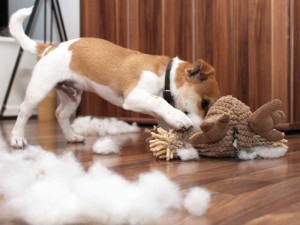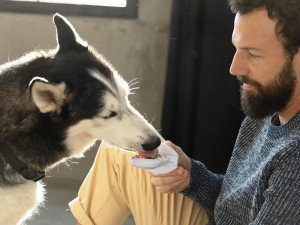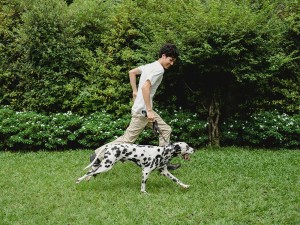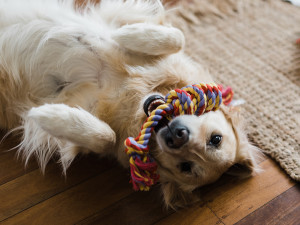Why Does My Dog Chew On Blankets?
A (seemingly) unstoppable nibbling obsession with all the blankets.
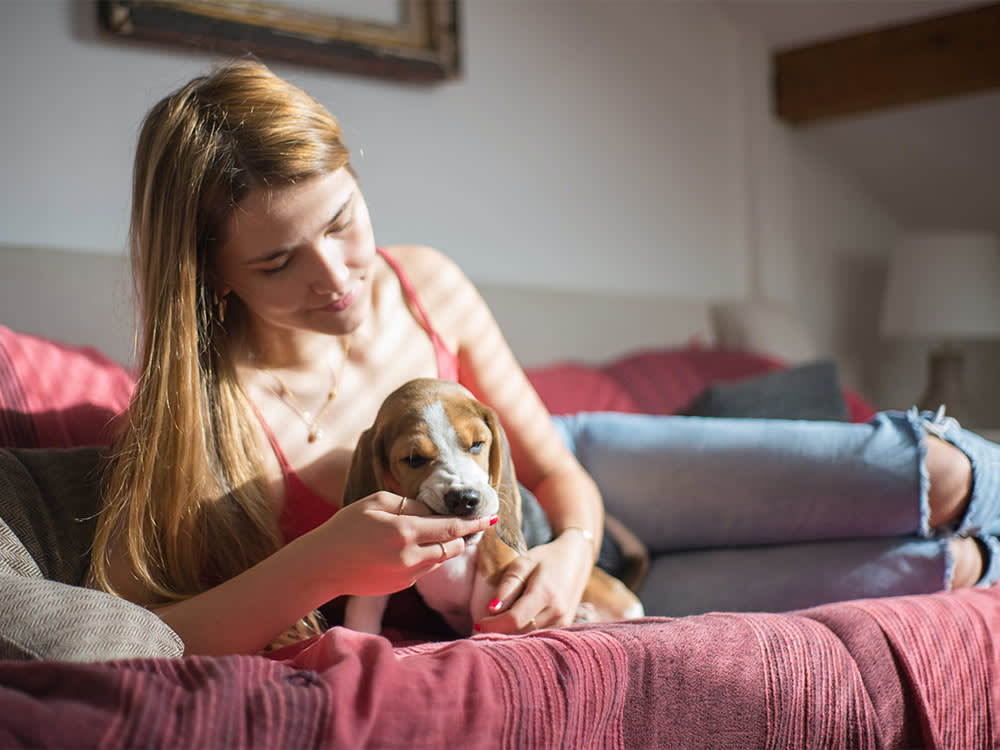
Share Article
I am obsessed with blankets. Turns out, so is my dog Leo. My blanket obsession began with a passion for textile design, which developed into a habit of buying any blanket, comforter, or quilt that caught my eye. Leo’s blanket habit is related to mine: Whenever I bring home a gorgeous coverlet, he has to chew a gigantic hole right in the middle — as soon as he is left alone with it for more than 20 seconds. While I had trouble with Leo, I’ve also learned a thing or two along the way.
Dealing With Compulsive Blanket Chewing
Sometimes I think fate must have ironically brought Leo and me together or that maybe Leo is saving me from the fate of being crushed under an avalanche of blankets when I open the linen closet. With Leo’s blanket munching, I recognized there were two issues that needed to be addressed. First, Leo could not be left alone with blankets until he learned chewing on them was inappropriate. Secondly, he needed a positive outlet for his chewing, such as a chew toy.
Keeping Leo away from blankets worked for like a week. His tenacity for finding unattended blankets was borderline inspiring. I’d leave the bedroom door open for a minute while I went to grab clothes from the dryer: Gigantic hole in the blanket. I’d take a catnap on the sofa: Down feathers everywhere when I awoke.
Since keeping him away from blankets wasn’t going to happen, I tried taste deterrents like bitter spray misted onto the blankets. Apparently, the only one affected by this was me. Many a nap was rudely ended by a bitter taste. After falling asleep in a blanket cocoon on the sofa (exhausted from watching back-to-back-to-back episodes of Cake Boss), my open mouth would inevitably make contact with the surface of the blanket. It was heinously gross. Meanwhile, Leo would power through the nasty flavor. For my sake, I gave up on the bitter spray.

My plan to redirect Leo’s affection from blankets to toys has been even less successful. Even after taking Leo to dog training, specifically to pique his interest in toys, he drifts after more than 20 seconds unless it is something he can eat (like a bully chew or a Kong toy). I see a future with a morbidly obese dog curled happily on elegant, intact quilts.
The reality is Leo and I both have issues that need to be dealt with (though I’d like to think that I can curb my blanket-purchasing habit as soon as I can curb Leo’s blanket-eating habit). What next? Do I give Leo one blanket and designate it as his? Do I concede that maybe I won’t have nice blankets ever? Why does he have an obsession with blankets?
Why Do Dogs Chew on Blankets?
Dogs are instinctive chewers that explore the world with their mouths so it is better to give them their own chew toys, blankets, and ropes rather than sacrifice your blankets, bedding, and furniture. “Chewing can help relieve stress and anxiety, keep their teeth clean, and keep their minds stimulated,” says Dr. Lori Teller, a clinical associate professor at the Texas A&M College of Veterinary Medicine. “Puppies also chew to relieve the pain and irritation of teething.” Here are a few reasons why dogs chew:
Boredom buster
Stress relief
Puppy teething
It feels good
Mental stimulation
How to Stop Your From Dog Chewing Blankets
Here are some tips that might work to stop your dog from chewing holes in your blankets. When in doubt, if you think the problem might be a medical issue, check in with your vet to make sure everything is okay, especially if the chewing turns into eating.
Exercise, exercise, exercise
Many dogs are prone to chewing or more destructive behaviors because they are bored. Exercise helps! In my case, Leo was already getting plenty of exercise, but it is a crucial starting point for anyone experiencing this problem.
Give them their own blanket
Chewing is a completely normal behavior in dogs, so it can be challenging to train against their nature. One option is to provide the dog a blanket that is theirs and okay to chew (assuming their interest isn’t in eating the blanket). Sure, the blanket will turn into a shredded mess, but it’s their shredded mess.
Just a phase
With some dogs, blanket chewing is an adolescent phase while they are teething; for others, it simply grows into a comforting tool. If your dog is young and still teething, you might find soft toys or stuffies are something that works.
Kongs
They work, even if it is just for a brief blanket chewing break. No better tool in keeping dogs busy than a stuffed kong. “Remove any toy that has reached the size where it can become a choking hazard or cause an intestinal obstruction,” says Teller. “If your dog chews off large pieces of the toy and swallows them, then that toy should also be taken away.”

Kate VandenBerghe
Kate VandenBerghe is the Creative Director and co-founder of Saint Friend in Portland, Oregon.
Related articles
![A bearded man in a gray sweater and yellow pants sitting on the floor and holding a Groov Training Aid in "lilac" from Diggs Pet, which is like a grooved plastic popsicle with treats smeared in, while his Husky dog licks it]()
9 Stress Toys For Dogs That Are Cheaper Than Therapy
The toys that’ll help your pup chill out after a long day of being a dog.
![Man running with dalmatian dog on a leash in a backyard with grass]()
An Active Dog Is a Well-Behaved Dog
Why regular exercise can mean a less destructive dog and a happier you.
![Golden Labrador dog laying on its back on the floor with a colorful rope toy in its mouth]()
12 Rope Toys Fit For Playful Pups
Two vets on the pros and cons of these canine classics.
![A man running and playing with his German Shepherd dog on a cloudy and rocky beach]()
8 Reasons It’s Better to Be a Dog Now than 25 Years Ago
It’s a good day to be a dog.
